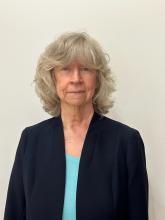Leadership
UCITE Director
Matthew Garrett, PhD, professor of music education, joined the faculty at Case Western Reserve University in 2009. Garrett has been involved with UCITE leadership since 2016, having served as faculty facilitator for the Learning Fellows program, and as interim director of the center. As director, Garrett continues to draw upon his background in education and learning pedagogy with more than 25 years of classroom teaching experience to help faculty members and students explore the art and science of teaching.
Garrett's research interests include LGBTQ Studies in Music Education and the development and utilization of critical thinking skills in music classrooms. He is an advisory board member for Oxford Intersections: Gender Justice, a new concept in interdisciplinary academic publishing from Oxford University Press. Garrett co-authored Honoring Trans and Gender-Expansive Students in Music Education (Oxford University Press) with Joshua Palkki in 2021. His scholarship has also been published in national and international music education journals. He has been interviewed regarding his work on developing critical thinking skills for articles in the national music education journal Teaching Music. His strategies for incorporating critical thinking strategies in choral music rehearsal environments were published as part of a hybrid print/online music text series from Hal Leonard and McGraw Hill Education, Voices in Concert.
Garrett has been nominated twice for the Carl F. Wittke Award for Excellence in Undergraduate Teaching. He has spoken on the CWRU Power of Diversity Lecture Series and on the Social Justice Institute Research Lunch Series. In 2016, Garrett was honored with a CWRU Prism Award for outstanding contributions to the campus LGBTQ community.
Originally from South Carolina, Garrett earned undergraduate and graduate degrees in music education from Florida State University. He also holds a masters degree in conducting, with department honors in choral conducting, from Boston University. Before joining the CWRU faculty, he was a music educator in Central Florida and Southeast Massachusetts public schools at the middle and high school levels. You can contact him at mgarrett@case.edu.
UCITE Associate Director
Jennifer Hadingham, PhD joined the CWRU community in 2020 with over 20 years of experience in faculty educational development. Initially the Assistant Director for UCITE, she was recently promoted to Associate Director.
Hadingham began her career at the University of the Witwatersrand, Johannesburg Center for Learning, Teaching and Development in South Africa. In 2011, she became the Assistant Director of the Center for Excellence in Teaching and Learning at the University of Rochester, New York. At Rochester, Hadingham expanded faculty development offerings to include teaching and mentoring training, graduate teaching assistant training, and undergraduate peer-led team learning classes.
Hadingham leads the UCITE Learning Fellows, AIIDE TLC, and Teaching Assistant Training programs as well as teaching UNIV 401: Advanced Professional Development for University Teaching. You can contact her at jennifer.hadingham@case.edu.
UCITE Department Administrator
Hollie McGivern, BA is excited to return to the CWRU community after spending time in the private sector. She brings many skills and several years of experience to UCITE, having previously worked in the Offices of the President and Provost, the Psychology department, and the School of Nursing.
She wears many hats in her role as Department Administrator, including writing, editing, graphic design, marketing, event planning, budget management, schedule wrangling, and the occasional office equipment repair. You can contact her at hollie.mcgivern@case.edu.
Foundations
Case Western Reserve's University Center for Innovation in Teaching and Education (UCITE) began as a vision of campus leaders to help faculty improve their teaching skills and, relatedly, to deepen student learning. In her role as Associate Provost, Dr. Sandra Russ launched the CWRU Lilly Fellows programs in 1991, and her stewardship of that program created the foundation for a formal teaching and learning center. Russ is a Distinguished University Professor, Louis D. Beaumont University Professor Emerita, and currently serves as the Faculty Senate Conciliation Counselor. A renowned clinical child psychologist, she served as a faculty member in the Department of Psychological Sciences for more than 40 years before her retirement from teaching in 2022. In addition to her service to the university as a professor, Russ provided leadership in a number of roles including periods as assistant provost, associate provost, two terms as chair of the faculty senate, and two separate appointments as interim dean of the College of Arts and Sciences.
With support of the Faculty Senate, CWRU President Agnar Pytte, CWRU Provost Richard Zdanis, and with major gifts from former CWRU President T.Keith Glennan, Evan and Eric Nord, and S. Sterling McMillan, Russ organized the University's first teaching and learning center, UCITE. In addition, Russ's leadership of the 1991-1994 Lilly Fellows helped to transform that successful program into the present Glennan Fellows program, a core component of the University Center for Innovation in Teaching and Education.
James Zull (1939-2019), PhD and Professor Emeritus of Biology, was appointed the founding Director of UCITE in 1994 and he served in that role for ten years, returning to his full-time faculty position in 2004. Zull noted that the initial goal of UCITE was to support and catalyze faculty activities which lead to innovative teaching and educational programs. Underlying this goal was the concept of the "teacher-scholar," a premise that continues to this day. Teacher-Scholars are expected to be creative contributors to their disciplines and to the teaching of that discipline. As leading scholars in their fields, Zull felt that CWRU faculty are positioned to develop leading educational programs and to utilize and contribute to the development of the most effective ways to teach their various disciplines. He suggested that the desire to be a member of an academic community presumes an underlying commitment to the objectives of improving teaching and learning.
Zull codified thinking and learning as products of a biological process in his seminal text, The Art of Changing the Brain (2002). Strengthening or changing biological process requires time and effort on the part of teacher and student. Former UCITE Director, Mano Singham, characterized Zull’s perspective: [Jim] said that we should focus less on teaching and more on learning (i.e., we should pay less attention to what the teacher says and more on what students are doing because that is what influences their neural connections and determines what they learn). Our teaching efforts should be directed towards creating the conditions that make students want to put in that effort in productive ways. Zull's contributions to the Science of Teaching and Learning literature continue to serve as foundational resources for teaching and learning centers: The Art of Changing the Brain and From Brain to Mind (2011).
Mano Singham, PhD, served as Assistant UCITE Director from 1998-2002, before being appointed as the Director and remaining in that role until his retirement in 2015. Singham was an adjunct associate professor of Physics, a theoretical nuclear physicist, and the author of four books: Quest for Truth: Scientific Progress and Religious Beliefs (2000), The Achievement Gap in US education: Canaries in the Mine (2005), God vs. Darwin: The War Between Creationism and Evolution in the Classroom (2009), and The Great Paradox of Science: Why Its Conclusions Can Be Relied Upon Even Though They Cannot Be Proven (2019).
You can contact him via email at mano.singham@case.edu. His personal blog deals with science, history and philosophy of science, religion, politics, the media, education, learning, books, and films.
Sarah de Swart, PhD, is the former Interim Director of UCITE (2015-2017) and a former Director of the Office of Faculty Development. She is an organizational and communications consultant, certified executive coach, team facilitator and professional voice and speech coach with more than 20 years experience in the areas of personal and professional development. A graduate of Harvard University with a bachelor’s degree cum laude in History and Literature, de Swart holds a Master’s degree in Theater Arts and Ph.D. in Organizational Behavior from Case Western Reserve University. She is also a professional actress who performs on local and national radio and television commercials and training videos.








